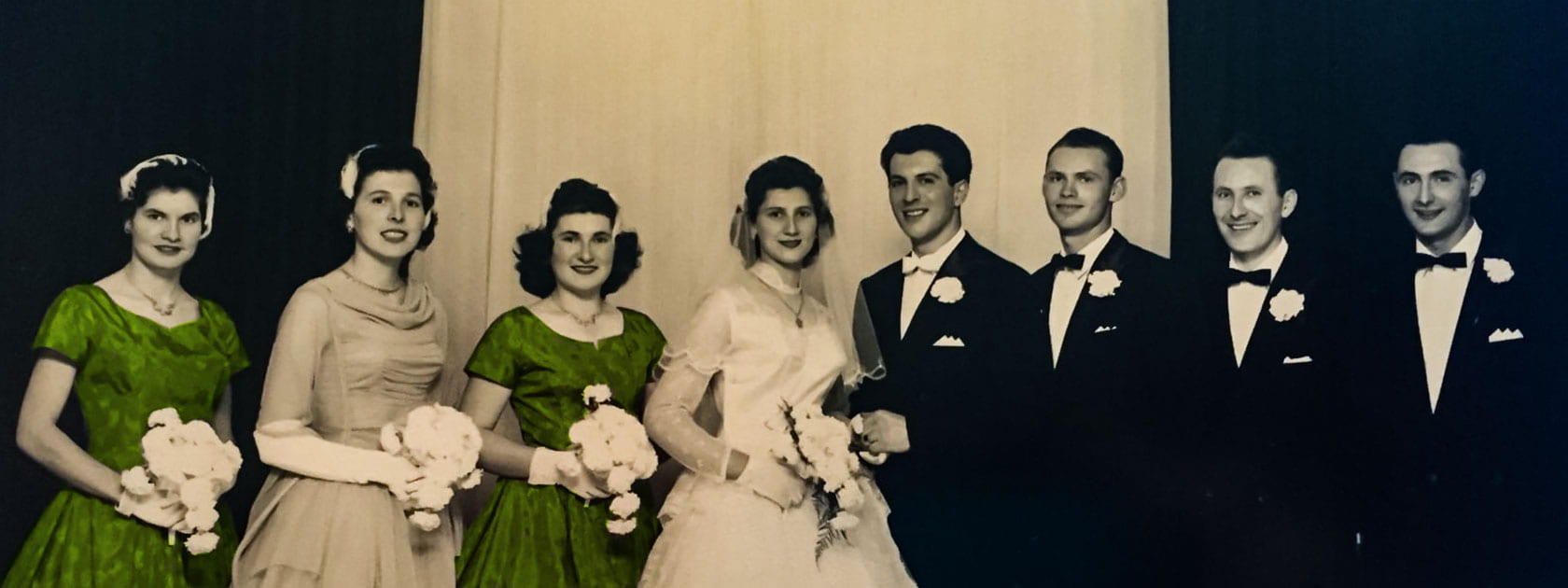Date
June 14, 2011
Maker
Columbus Centre
Accession#
ICEA2011.0040.0001
Interview With Antoinette Palmeri
Antoinette Palmeri was born in 1929 in Montreal. Both of her parents were born in Italy. Her father, Vito Palmeri, immigrated to Canada when he was 16 years old, leaving both his parents behind in Salemi, Italy. He travelled back to Italy often to visit his aging parents and when he was in his mid-30s his parents advised him to take a wife. It was during one of his last trips to Italy that he met his wife, a seamstress. They married and came to Canada where they settled in Montreal. The couple had two children Antoinette and Frances. Antoinette recounts her early years of attending a school run by both American and French Canadian nuns, where she received a trilingual education. She also speaks of the various neighbourhoods in Montreal. She highlights the Italian customs she grew up with and the various Italian activities and associations she both participated in and knew of, such as the balillas and the Casa d’Italia. On June 10, 1940, two Royal Canadian Mounted Police (RCMP) came to the door during dinner to arrest her father. The family was in the middle of dinner and was allowed to continue eating as the officers waited patiently. Her father was first taken to Bordeaux Jail and then transferred to Petawawa where he remained for two years. In his absence the family struggled to make ends meet, with Antoinette’s mother working as a seamstress and washing clothes. The family received no relief despite their pleas to the government. Antoinette believes that it was her father’s association with fascism that led to his arrest. Upon his return her father spoke little of the experience, only telling a few stories of how the internees would take to practical joking to pass the time. Even in her later years Antoinette does not know many of the details surrounding her father’s internment as the event was never discussed in public, even amongst of families of the interned.
In this opening clip Antoinette Palmeri introduces herself and briefly speaks about her family.
Antoinette Palmeri speaks about the Montreal neighbourhood she grew up in and her schooling.
Antoinette Palmeri speaks about her local church, Madonna della Difesa, and the fresco of Mussolini painted by Guido Nincheri.
Antoinette Palmeri speaks about socializing with other Italian families in her nieghbourhood.
Antoinette Palmeri shares the story of how her parents met.
Antoinette Palmeri speaks about the Casa d’Italia and her participation in the balillas and Italian classes.
In this clip Antoinette Palmeri speaks about Emanuele Cosentino’s band and the processions that took place in her neighbourhood.
Antoinette Palmeri recalls how Italians were treated in Montreal prior to the outbreak of war. She also recalls that the Italians did not buy Victory Bonds because they did not have money to spare.
In this clip Antoinette Palmeri talks about the local Italian Canadian boys who feared being conscripted because they did not want to fight in Italy.
Antoinette Palmeri recalls that her mother donated her gold wedding band to the Italian government to support their war in Ethiopia.
In this clip Antoinette Palmeri describes the events of June 10, 1940 when her father was arrested at their family home.
Antoinette Palmeri continues detailing the events of June 10, 1940. She explains how her family found out where her father had been taken and describes the letters they would eventually receive from Petawawa.
Antoinette Palmeri mentions how she did not discuss her father’s internment with anyone during his absence.
Antoinette Palmeri briefly mentions how all the Italian stopped attending the Casa d’Italia or other social gatherings after June 10, 1940.
Antoinette Palmeri shares stories about life in the camp that she heard from her father after his return.
Antoinette Palmeri describes how her mother coped during the internment period.
Antoinette Palmeri reads the letter her mother sent to the government asking for assistance in her husband’s absence.
Antoinette Palmeri explains how her family did not get any assistance from the government or the Church during her father’s internment.
In this clip Antoinette Palmeri explains how her father used to wash clothes for the other prisoners in the camp in exchange for money. He would then send this money home to support the family.
Antoinette Palmeri speaks about her father’s appearance before the camp tribunal and his return home.
Antoinette Palmeri speaks about her father having to report to the RCMP upon his release from the camp. She also speaks of how her father slowly was able to find work.
In this clip Antoinette Palmeri shares that according to her father, he was interned due to his involvement with the local fascio.
Antoinette Palmeri shares her feelings on what she thinks should have been done for the families of the interned.
Antoinette Palmeri continues sharing her feelings on the internment period.
In this clip Antoinette Palmeri shares her opinions regarding the treatment of the Italian Canadian men by the Canadian government.
In this final clip Antoinette Palmeri speaks about compensation.



